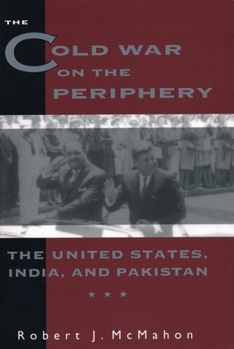The Cold War on the Periphery: The United States, India, and Pakistan
Select Format
Select Condition 
Book Overview
Focusing on the two tumultuous decades framed by Indian independence in 1947 and the Indo-Pakistani war of 1965, The Cold War on the Periphery explores the evolution of American policy toward the subcontinent. McMahon analyzes the motivations behind America's pursuit of Pakistan and India as strategic Cold War prizes. He also examines the profound consequences--for U.S. regional and global foreign policy and for South Asian stability--of America's complex political, military, and economic commitments on the subcontinent.
McMahon argues that the Pakistani-American alliance, consummated in 1954, was a monumental strategic blunder. Secured primarily to bolster the defense perimeter in the Middle East, the alliance increased Indo-Pakistani hostility, undermined regional stability, and led India to seek closer ties with the Soviet Union. Through his examination of the volatile region across four presidencies, McMahon reveals the American strategic vision to have been "surprinsgly ill defined, inconsistent, and even contradictory" because of its exaggerated anxiety about the Soviet threat and America's failure to incorporate the interests and concerns of developing nations into foreign policy. The Cold War on the Periphery addresses fundamental questions about the global reach of postwar American foreign policy. Why, McMahon asks, did areas possessing few of the essential prerequisites of economic-military power become objects of intense concern for the United States? How did the national security interests of the United States become so expansive that they extended far beyond the industrial core nations of Western Europe and East Asia to embrace nations on the Third World periphery? And what combination of economic, political, and ideological variables best explain the motives that led the United States to seek friends and allies in virtually every corner of the planet? McMahon's lucid analysis of Indo-Pakistani-Americna relations powerfully reveals how U.S. policy was driven, as he puts it, "by a series of amorphous--and largely illusory--military, strategic, and psychological fears" about American vulnerability that not only wasted American resources but also plunged South Asia into the vortex of the Cold War.Format:Paperback
Language:English
ISBN:0231082274
ISBN13:9780231082273
Release Date:April 1996
Publisher:Columbia University Press
Length:431 Pages
Weight:1.70 lbs.
Dimensions:1.1" x 5.7" x 8.8"
Grade Range:Postsecondary and higher
Customer Reviews
3 ratings
The Limits of Power
Published by Thriftbooks.com User , 24 years ago
A superb book, indeed. McMahon musters the research necessary to demonstrate the shortsighted and even foolish choices of all concerned parties in South Asia's post-independence history. If politics may be defined as the art of the possible, as it so often is, we may ask today whether the South Asian outcomes generated by the United States, the Soviet Union, Pakistan and India were in any way necessary. Could this history have been different? Yes! India and Pakistan could have settled their differences over Kashmir. The United States could have abstained from giving Pakistan military aid that hindered its economic and political development while enabling it to avoid pursing a political solution to its political problems, especially those in Kashmir and East Pakistan. India could have gained more aid than it did from the United States while retaining its neutralist position if it had avoided the ritualistic use of self-righteous and inflammatory rhetoric vis-à-vis the United States. It too could have settled the Kashmir question, but it was far too stubborn for that. After reading McMahon's book, I could only conclude that the relevant actors were too blinded by ambition, power and fear to grasp the human reality of the situation. What was needed was state building and statecraft that would enable India and Pakistan to feed its people, to resolve their political differences and to create a political community in the region that would work to ensure the dignity and freedom of the many peoples and nations residing there. We are awaiting these outcomes still.For those individuals concerned with South Asian politics, this book is a must read.
Provides an indepth understanding of US policy towards India
Published by Thriftbooks.com User , 25 years ago
This book provides a detailed account of what continues to drive US policy towards India and Pakistan. It provides straight answers to the question most lay Americans have about India's tilt towards the Soviet Union and why the US continues to prop up the fundamentalist, dictatorial and terrorist nation of Pakistan.
A Remarkable book
Published by Thriftbooks.com User , 25 years ago
A magnificent book. Must read for anyone interested in knowing the truth - at least now that the Soviet bear no more haunts us and we are free to call a spade a spade.M. Zafar Minnesota





